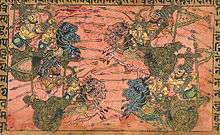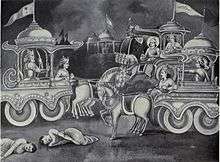Shikhandi
Shikhandi (Sanskrit: शिखण्डी, Śikhaṇḍī, lit. lock on the crown of the head) is a character in the Hindu epic, the Mahabharata. He was born a baby girl, named "Shikhandini," to Drupada, the king of Panchala. Shikhandi fought in the Kurukshetra war for the Pandavas along with his father Drupada and brother Dhristadyumna.
| Shikhandi | |
|---|---|
| Mahabharata character | |
 Kripa fights with Shikhandi (top right) | |
| In-universe information | |
| Gender | Female turned Male[1] |
| Family | Drupada (father) Kokila (mother) Satyajit Dhristadyumna (brothers) Draupadi (sister) |
| Spouse | a Dasarna princess |
| Children | Kshatradeva |
Past Life
In the majority of the versions of the Mahabharata,[2] there is the story of Shikhandi being Amba in his previous birth.
Shikhandi had been born in a previous lifetime as a woman named Amba. Amba was the eldest daughter of the King of Kashi. Along with her sisters Ambika and Ambalika, she was taken from their Swayamvara by force by Bhishma, as punishment to the Kingdom of Kashi for not inviting Hastinapur nobility to the event. After defeating several kings, including Salwa, the King of Saubala, Bhishma absconded with the princesses and presented them for marriage to Vichitravirya, the crown prince of Hastinapur.[3]
Vichitravirya married only two sisters, because Amba told Bhishma that she had fallen in love with the king of Salwa, and was not ready to marry anyone else. Hearing this from her, Bhishma sent Amba with grandeur to Saubala. But Salwa rejected her as well, in shame of losing the combat against Bhishma. Amba then returned to Bhishma and demanded that he marry her according to Kshatriya dharma, but Bhishma declined due to his vow of celibacy. Enraged at her humiliation, she tried to persuade other kings to wage a war with Bhishma and compel him to wed her. None agreed for they were afraid of incurring the wrath of the great warrior. Amba got Parashurama, Bhishma's guru, to champion her cause. However, not even Parashurama could defeat Bhishma.[3]
According to the summary by C. Rajagopalachari, she resorted to penance and received a garland of blue lotuses from Lord Kartikeya and it was foretold that anyone wearing the garland would become the cause of Bhishma's death. She went to the Panchal, as they were a mighty empire known for its military prowess. However, no one was willing to champion her cause, fearful of antagonizing Bhishma. Amba, in anger, hung the garland on the gates of King Drupada and left in agony.[4]
Amba did severe penance to Lord Shiva for a boon to cause Bhishma's death. Eventually, her prayers were answered. But, being a woman with no military training, she asked Shiva how she would accomplish her task, and he responded that her future incarnation would be the one to actually bring about Bhishma's demise. Eager to bring this about, Amba killed herself; in some versions of the story to explain the time gap between the abduction at Kashi and the Kurukshetra war, Amba keeps on killing herself until she is incarnated into satisfactory situation.[5] Amba was reborn as Shikhandini, the daughter of King Drupada.
In the Ganguly translation of the Chatahurdi compilation of the Mahabharat, Rishi Vaisampayana tells Janamejaya that Shikhandi was the incarnation of a rakshasa.[3]
Shikhandi's Gender
In most versions of the story, Shikhandi is male but born female. When Shikhandini changes her sex, she becomes Shikhandi, but is a eunuch.[2] According to C. Rajagopalachari's Mahabharata, when Shikhandini was still living as a young woman she discovered the garland of ever-blooming blue lotuses hung on the palace gate. Shikhandini put it around her neck. When Drupada saw his child wearing the garland, he became fearful of becoming Bhishma's enemy, and Shikhandini was banished from the kingdom. She performed austerities in the forest and was transformed into a male named Shikhandi.[6]
In another version of the story, Drupada desires an heir, and wanders the forest to settle his disquieted mind. He comes upon the toddler Shikhandini. When Drupada picks her up, a heavenly voice tells Drupada to raise her as a man. Drupada raised his daughter as a son and had Shikhandini married to a princess of Dasharna. She complained to her father, Hiranyavarna, that her husband was a woman. When the king sent people to check this fact, Shikhandini panicked and escaped into a forest, where she met a Yaksha who exchanged his sex with her. The Yaksha king sees the Yaksha as a girl and curses him that he will remain in the form till Shikhandi dies, keeping the sex-swap in place.[7] In many versions of the story, the change results in Shikhandi being a eunuch; in others, it doesn't.[8]
In some versions of the story, Amba is simply reborn as a male Shikhandi, sometimes whole and sometimes a eunuch. In even other versions, Shikhandi is a male but transgender, due to Shiva's boon that Amba will remember all the details of her past life.[5] In early versions of the Mahabharatha, Shikhandi is still Amba-reborn, but a straight female. Because Panchala doesn't practice gender discrimination, she is trained to become a warrior and fights in the Kurukshetra War (this being the original reason why Amba kills herself again and again, wanting to be born to a culture that will allow her to fight Bhishma). Her identity was hidden by her family. When she attained her youth, was married to daughter of Hiranyavarman, the king of the Dasarnakas. Hiranyavarman daughter when came to know her husband is woman, represented unto her companions everything, who informed her father. King Hiranyavarman, filled with fierce wrath, sent a war messenger unto Drupada. Drupada becomes alarmed because of the situation, and his wife advises him to please the gods with charity to the Brahmins. Sikhandini, who was listening, felt shameful, left home, filled with heavy sorrow, and went into a dense forest. There she met with a kind Yaksha named Sthuna, who, after asking her to share her troubles with him, exchanges his sex with hers, albeit for a limited time. Drupada, upon learning about the occurrence of this event, becomes overjoyed, and sends envoys to Hiranyavarman with the good news. Hiranyavarman, ever suspicious, then sent young ladies to ascertain Sikhandi's gender; the women confirmed Sikhandi's manliness to their king. Hiranyavarman went happily into Drupada's abode, and spent some time there as family. Meanwhile Kuvera comes there, and learning of Sthuna's condition, cursed the Yaksha to remain female. After the Yakshas beg him to set a limit to curse, he obliged, setting the curse duration to last until Sikhandi's death.[9][5]
In the Ganguly translation of the Chatahurdi compilation, Shikhandi has a son whose name was Kshatradeva.[10]
Battle of Mahabharatha

In the battle of Kurukshetra, Bhishma recognised him as Amba reborn, and not wanting to fight a "woman" (or an actual woman, depending on the version), avoided battling Shikhandi. On the tenth day, many warriors of Kaurava Army attacked and wounded Shikhandi and some stopped the Pandavas. Drona stopped Arjuna, Duryodhana stopped Bhima, Shalya stopped Yudhishthira, Vrikaasur stopped Nakula and Uluka stopped Sahadeva. Firstly, Ashwatthama attacked Shikhandi but Drupada took him, then Dussasana attacked Shikhandi but Dhrishtadyumna took him and at last Shakuni attacked and Stabbed Shikhandi but Virata stopped him. Later, wounded Shikhandi rides in Arjuna's chariot, and together, they face Bhishma, forcing him to lower his weapons. Knowing that this would happen, Arjuna hid behind Shikhandi and attacked Bhishma with a devastating volley of arrows. Thus, Shikhandi was instrumental in Bhishma's death. Death
Shikhandi was finally killed by Ashwatthama on the 18th day of battle, killed dazed and confused, Shikhandi is killed in a sword fight with Ashwatthama when Ashwatthama, Kripacharya, and Kritaverma attacked the Pandava camp on the night of the final day of battle.[11] In some versions of the Mahabharat, Ashwatthama kills Shikhandi's lover (male or female) in front of him; in other versions, it is Shikhandini's partner (male/female) who is butchered.[5]
References
- "The Mahabharata, Book 8: Karna Parva: Section 6". www.sacred-texts.com. Retrieved 22 January 2020.
- Sorabji, Cornelia, and Warwick Goble. Shikhandi: The Maiden-knight and Other Stories. Bombay: Blackie and Son, 1916. Print.
- http://www.sacred-texts.com/hin/m01/m01068.htm
- Rajagopalachari, Raja (1951). Mahabharata. Bharatiya Vidya Bhavan. p. 22.
- Pattanaik, Devdutt. Shikhandi and Other Tales They Don't Tell You. N.p.: n.p., n.d. Print
- Mahabharata Summary By Rajaji, Mahabharata Stories , Stories and Characters from Mahabharata, Mahabharatam in Telugu, Tamil, Kannada, Hindi
- MAHABHARAT : The king of Kashi's three beautiful daughters, Amba, Ambika and Ambalika Archived 12 August 2012 at the Wayback Machine
- Gāḍīta, Jayanta. Shikhandi. Ahmedabad: Parshwa, 1990. Print.
- Tewary, Siddarth. "Episode 62". Mahabharat (2013). Series 1. Episode 62 (in Hindi). STAR Plus.
- http://www.sacred-texts.com/hin/m08/m08006.htm
- "Archived copy". Archived from the original on 17 June 2012. Retrieved 17 June 2012.CS1 maint: archived copy as title (link)
External links
- Summary and Complete translation of Mahabharata
- On Krishna’s chariot stands Shikhandi
- On Shikhandini's life , book by Ashwini Shenoy

